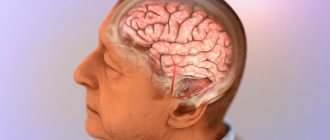For many people, senile dementia and Alzheimer's disease are synonymous, but in reality they are not. Understanding the differences between these pathological conditions contributes to early access to doctors, which allows preserving a person’s identity for a longer time.
The external signs of dementia and Alzheimer's disease are similar. In both cases, the first symptoms occur in old age, and both diseases affect higher nervous functions. The patient's level of intelligence decreases, memory deteriorates, and disorders develop in other areas.
But there is no point in equating these two pathological conditions. Dementia is a symptom of a number of diseases associated with brain disorders. Alzheimer's disease is a severe brain disease that leads to the development of dementia.
Etiology
Vascular dementia: Often caused by an acute, specific event, such as a stroke or transient ischemic attack, when the blood supply to the brain is disrupted. The disease can also develop gradually, over a long time, due to the presence of small blocks in the vascular bed (narrowing of the lumens of blood vessels caused by one reason or another) or chronically slow cerebral blood flow.
Alzheimer's Disease: While there are several ways to reduce the likelihood of developing Alzheimer's disease, such as physical activity and keeping your mind active, we still don't know what causes Alzheimer's disease. The prevailing view in medicine today is that there are many components that can contribute to the development of Alzheimer's disease - such as genetics, lifestyle, and various other factors.
Difference between diseases
When diagnosing various types of dementia and Alzheimer's disease, the differences between these pathological disorders make it possible to differentiate the diseases and prescribe adequate treatment to the patient. Dementia is often a comorbidity of Parkinson's disease. Dementia accompanies Alzheimer's disease.
The difference between Alzheimer's disease and dementia is that Alzheimer's disease always leads to dementia (senile dementia), but dementia is not always caused by Alzheimer's disease - there are a number of other factors and causes that cause dementia.
Symptoms
Cognitive (cognitive) sphere
Vascular dementia: Cognitive abilities often decline suddenly due to a vascular accident in the brain - such as a stroke or transient ischemic attack - and then remain stable at the same reduced level. These cognitive changes are often described as “steps” because cognitive functioning between such rapid changes can be considered stable.
Alzheimer's disease: While cognitive abilities may change somewhat with the onset of the disease, a person's ability to think and use their memory does decline gradually over time. In Alzheimer's disease, as a rule, there is no history of sudden changes in the cognitive sphere (within one day).
Impaired memory and memory retrieval are typical in the early stages of Alzheimer's disease.
Walking and physical movements
Vascular dementia: Often accompanied by physical problems. For example, if your loved one suffered a stroke, they likely have limited mobility on one side of their body. Both cognitive and physical declines associated with vascular dementia usually develop at the same time, as they are often consequences of the same sudden illness, such as stroke.
Alzheimer's disease: The disease often begins with changes in mental abilities, usually represented by memory loss or decreased judgment. However, over time, when the disease enters the second stage, deterioration of physical abilities is also detected, such as the ability to maintain balance or gait.
Alzheimer's dementia
This syndrome most often affects people over 60 years of age, resulting in late-onset Alzheimer's dementia. However, in some cases, the disease can also affect relatively young people who have reached 40-45 years of age.
Pathogenesis and symptoms
In Alzheimer's pathology, a special protein accumulates in brain cells, forming plaques, and neurofibrillary tangles are formed from affected neurons. Both of these processes lead to disruption of neural connections, and Alzheimer's type dementia occurs.
The signs of this pathology are:
- progressive memory disorder;
- Over time, the patient ceases to perceive what is happening around him;
- loss of ability to navigate in time and space;
- progressive loss of skills and knowledge;
- in the later stages the patient does not recognize loved ones;
- loss of knowledge about the essence of objects and phenomena;
- speech impairment and its gradual loss (may remain in the form of muttering or moaning);
- loss of self-care skills;
- Over time, urination and defecation become spontaneous and uncontrollable;
- in the final stages, the patient falls into complete apathy and does not interact in any way with the outside world.
These symptoms of dementia of the Alzheimer's type make it possible to suspect pathology in the initial stages. If you notice signs of illness in yourself or your loved ones, you should immediately consult a doctor. Timely diagnosis will allow earlier initiation of therapy, which can slow down the progression of the disease itself and its unpleasant symptoms.
Dementia due to Alzheimer's disease may also be confirmed by the following criteria:
- gradual (often even imperceptible) onset;
- inevitable progression of symptoms;
- the patient does not have other pathologies that can lead to the development of dementia.
Unfortunately, today Alzheimer's syndrome is an incurable disease. Due to ignorance of the exact cause and mechanism of development of the disease, treatment of dementia of the Alzheimer's type is reduced only to maintenance therapy, which is unable to completely eliminate the pathology.
Stages
Alzheimer's disease, like many other long-term diseases, is characterized by a gradual development. Therefore, several stages of dementia can be distinguished in this pathology.
- Initial dementia of the Alzheimer's type. It manifests itself with almost imperceptible signs, the main of which will be memory impairment. The patient may forget the meaning of some words or some events. In addition, he has difficulties with analysis, forecasting and abstract thinking. At this stage, the patient himself is aware of the problems that arise, which is why emotional disorders develop. They can lead to insomnia, irritability, and cravings for alcoholic beverages.
- Early dementia due to Alzheimer's. Strong changes in the patient’s facial expressions, manifested by a constant expression of surprise on the face (rounding of the eyes, raising of the eyebrows, slightly open mouth). The patient forgets about the need for hygiene and begins to have difficulty oriented in space. There are difficulties with counting and writing, and slower motor activity.
- Middle stage of dementia. A person does not recognize loved ones, forgets almost all events from his own life. He is incapable of writing and reading, and his coordination of movements is clearly impaired. The patient becomes apathetic or shows aggression. Speech is impaired: the patient is unable to find words or is completely silent.
- Severe stage of Alzheimer's dementia. This last stage of the disease is characterized by the absolute destruction of a person’s personality. He does not recognize his reflection in the mirror, cannot remember who he is, and does not understand what is happening around him. The patient hardly moves, there is no speech. Tremors of the limbs and disorders in the form of delirium are often noted.
Progression of brain damage in Alzheimer's syndrome
| Stage | Changes in brain structures |
| Initial |
|
| Heavy |
|
With each stage, the disease progresses more and more, making the person absolutely helpless.
Diagnostics
Vascular dementia: Some psychological tests can help assess your loved one's memory, judgment, communication and general cognitive abilities. In addition to these tests, MRI (magnetic resonance imaging) of the brain can clearly show the specific area of the brain that was damaged due to a stroke or transient ischemic attack.
Alzheimer's disease: Similar cognitive testing is used for Alzheimer's disease. Otherwise, this disease is diagnosed by excluding similar pathologies, since at present it is impossible to establish an accurate diagnosis by any instrumental or hardware research, for example, by scanning the brain. There is currently no reliable diagnostic test to diagnose Alzheimer's disease, so doctors rule out other, reversible causes of the disorder - such as vitamin B12 deficiency or hydrocephalus with normal intracranial pressure, as well as other types of dementia or delirium.
About dementia
What is dementia?
Dementia is the scientific name for the loss of cognitive functions, that is, the ability to think, remember, count, and recognize objects.
It is difficult for the patient to navigate the world around him and to learn new things. Dementia is an acquired condition, meaning that a person may have had very high intelligence before the illness. Even brilliant people are not immune from it, of which there are many examples. Dementia is not a single disease; it can be caused by a variety of reasons, from hereditary diseases to alcoholism and infections. It is important to understand that dementia is not the norm at any age. It is always necessary to find out the cause of dementia, if only because some types are curable.
How common is dementia?
When a loved one develops dementia, many people think that this problem only happened to them. In fact, approximately one in ten people over 60 years of age has dementia, but at the very beginning the disease may not be very noticeable to others. Many patients do not see a doctor, or the doctor does not consider the signs of dementia to be a problem worthy of diagnosis. Relatives hear the typical: “What do you want? He’s old,” and that’s where the examination ends.
How are dementia and Alzheimer's disease related?
Alzheimer's disease is the cause of dementia in the elderly in two thirds of cases. The essence of the disease is that nerve cells in certain parts of the brain gradually die. Scientists know what changes occur inside these cells, but so far, unfortunately, they have not found any one reason why these processes begin.
Types of dementia
Dementia can occur due to various reasons, such as traumatic brain injury, stroke, but the most common is Alzheimer's disease - more than 60% of cases. There are also other types of dementia.
- vascular dementia;
- frontotemporal dementia;
- dementia with Lewy bodies;
- mixed dementia.
- Alzheimer's disease
- other types of dementia
Vascular dementia
With this type of dementia, the blood vessels of the brain are affected, as a result of which nerve cells do not receive proper nutrition and die. Memory, speech, and thinking deteriorate. Vascular dementia accounts for approximately 10-15% of all dementias in the elderly. Stroke significantly increases the risk of vascular dementia in the elderly (20-30% of cases), as does chronic cerebral circulatory disorders. Among the stable signs of vascular dementia are problems with urination.
The second most common cause of such problems is vascular dementia (a consequence of cholesterol deposition in the blood vessels of the brain). These two diseases present with similar symptoms, and often the two processes develop simultaneously, and then the diagnosis is “combined” or “mixed” dementia.
Frontotemporal dementia
Frontotemporal dementia is often called Pick's disease or presenile dementia. The first signs of Alzheimer's disease may appear before age 65. A characteristic feature of frontotemporal dementia is a genetic factor. Up to half of the cases are family complications. Frontotemporal dementia is characterized by a predominance of early behavioral and emotional disorders. Unlike Alzheimer's disease, patients' memory can remain in relatively good condition for quite a long time.
Dementia with Lewy bodies
This type of dementia is often confused with Alzheimer's disease. But unlike her, patients with this type can react severely to antipsychotics, which are often prescribed for Alzheimer's disease. The development of severe adverse reactions can lead to death in patients with dementia with Lewy bodies.
With Lewy body disease, disturbances in concentration and attention . Attention suffers more than speech and memory. The patient gets tired quickly and is easily distracted from the work he has started. He finds it difficult to complete a task. As a result, a fixation on the same action and its repeated repetition may occur.
Another characteristic feature of Lewy body dementia is visuospatial disturbance . Against this background, visual hallucinations often appear: the patient mistakes inanimate objects for animate ones, sees images of familiar and unfamiliar people. Hallucinations usually appear in the evening or at night. In the early stages, more than half of the patients suffer from them, in the later stages - up to 80%.
Another characteristic sign of dementia with Lewy bodies is a movement disorder - parkinsonism , which manifests itself in the earliest stages of the disease. This may be tremors, changes in gait, shuffling, or imbalance. Falls are an important diagnostic feature of dementia with Lewy bodies.
The difference between Lewy body dementia and Alzheimer's disease is its rapid progression . About five years after the first signs, the stage of severe dementia begins.
Dementia in other diseases
- Parkinson's disease;
- Huntington's disease;
- HIV-associated dementia;
Factors that increase the risk of dementia
- elderly age;
- genetics (heredity);
- high blood pressure;
- high cholesterol;
- diabetes;
- obesity;
- deafness;
- head injuries;
- social isolation;
- depression and stress;
- air pollution.
More details about dementia in our sections:
- Signs of dementia - signs and test to determine dementia, which you can do yourself at home.
- If a loved one has dementia - an action plan for a dementia diagnosis
- If you have dementia - what to do if you are diagnosed with dementia. How to reconcile and what to expect.
- Frequently asked questions about dementia
Forecast
Vascular dementia: Due to the huge variety of causes of damage and the varying severity of these damage in brain structures, it is difficult to predict life expectancy for patients with vascular dementia. The progression of vascular dementia depends on a number of factors, including the extent of damage to the brain.
Alzheimer's disease: The average life expectancy for people with Alzheimer's disease is 84.6 years, and the life expectancy after the first symptoms appear is 8.4 years.
Sources:
Alzheimer's Association. Risk Factors. Accessed July 31, 2012. https://www.alz.org/alzheimers_disease_causes_risk_factors.asp
Alzheimer's Association. Vascular Dementia. Accessed June 26, 2012. https://www.alz.org/dementia/vascular-dementia-symptoms.asp»>https://www.alz.org/dementia/vascular-dementia-symptoms.asp
Clin Interv Aging. 2006 September; 1(3): 229-235. Vascular dementia: prevention and treatment. https://www.ncbi.nlm.nih.gov/pmc/articles/PMC2695177/
Geriatrics and Aging. 2007;10(1):36-41. Vascular Dementia and Alzheimer's Disease: Diagnosis and Risk Factors. Accessed July 31, 2012. https://www.medscape.com/viewarticle/555220_1
https://alzheimers.about.com/
All materials on the site are presented for informational purposes only, approved by a certified physician, Mikhail Vasiliev, diploma series 064834, in accordance with license No. LO-77-005297 dated September 17, 2012, a certified specialist in the field of psychiatry , certificate number 0177241425770.
Atherosclerosis of cerebral vessels
Atherosclerosis of cerebral vessels is a disease characterized by the formation of atherosclerotic plaques in which lipids (fats) accumulate. The inflammatory infiltrate, as well as the process of arterial fibrosis and hardening, are called atherosclerosis. As a result of these changes, the vessel narrows, which restricts blood flow. Due to the fact that the cells of the nervous system are especially sensitive to hypoxia, cerebral atherosclerosis can lead to neurological disorders, such as memory impairment in older people. Senile sclerosis sharply reduces the patient's quality of life and often leads to depression.
The first symptoms of cerebral hypoxia as a result of impaired vascular blood flow may be headaches, dizziness, as well as psychological manifestations associated with developing vascular dementia. With sclerosis, patients lose the ability to perceive new information and have problems with daily activities. They feel helpless and sometimes leave their home and wander aimlessly around the area, forgetting the way back.
Symptoms of dementia
The first stage often goes unnoticed: forgetfulness, loss of counting time and time, loss of orientation in familiar areas.
Middle stage: forgetfulness of events, names, names of people, disorientation, difficulties in communication, assistance in caring for oneself is needed. At this stage, changes become obvious and include walking aimlessly and repeating the same questions.
At the last stage, memory impairment progresses - loss of orientation in time and space, difficulties in recognizing relatives and friends, the person cannot take care of himself, has difficulty moving, and is aggressive.











